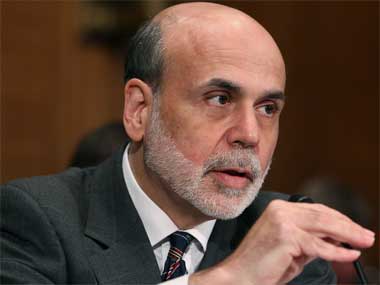New York: Federal Reserve Chairman Ben Bernanke has taken some of the wind out of the market’s sails. In his testimony before a Congressional panel on Thursday, he said the central bank is prepared to take further steps to boost the US economy if it weakens, but he didn’t signal any Fed action was close at hand.
Bernanke kicked off a rally in the US dollar on Thursday by sounding less dovish than everyone had anticipated. The Fed is still prepared to act, according to Bernanke, but he wants to keep the market guessing about QE3. Bernanke, testifying before the congressional Joint Economic Committee, said that the Fed remains ready to act if the economy needs it, but he didn’t say any impending steps were on the way.
[caption id=“attachment_194782” align=“alignleft” width=“380” caption=“The Big Ben strikes a note of caution. Getty Images”]  [/caption]
“As always, the Federal Reserve remains prepared to take action as needed to protect the US financial system and economy in the event that financial stresses escalate,” Bernanke told the Congressional Joint Economic Committee.
Some traders had hoped for more from Bernanke after Dennis Lockhart, the president of the Fed’s Atlanta bank, said on Wednesday that sustained weakness in job creation could justify more action to support the economic recovery. After Lockhart’s comment, US stocks rallied on Wednesday, giving benchmark indexes their biggest gains in 2012 on speculation the Fed would take steps to stimulate economic growth.
Expectations grew more realistic after the Fed said later on Wednesday in its latest “Beige Book” summary of business activity that the US economy was picking up at a “moderate” pace. The Fed chief echoed the same sentiment at Thursday’s hearing.
Economists say that with Bernanke’s testimony, expectations that the Fed will alter its stance anytime soon have been all but eliminated. Instead, the Fed will stay in “wait and see” mode.
Bernanke said the eurozone crisis has more potential to hurt the US economy than a slowdown in China. He suggested a less blazing Chinese economy could actually benefit the US. Bernanke explained that when the Chinese economy slows, it tends to result in a decline in oil prices, helping the US economy, which is strongly affected by high commodity prices.
“The crisis in Europe has affected the US economy by acting as a drag on our exports, weighing on business and consumer confidence, and pressuring US financial markets and institutions,” Bernanke said. He said US banks are stronger than they were several years ago, giving them some protection from the turmoil in Europe. “Nevertheless, the situation in Europe poses significant risks to the US financial system and economy and must be monitored closely.”
“I don’t think we need QE3,” Hank Smith, chief investment officer of Haverford Trust, told the finance blog Breakout. “We should be thankful the Fed is doing what it’s doing.”
Since the financial crisis, the Fed has launched two rounds of quantitative easing, by buying bonds to drive down interest rates. One started in November 2008 and ended in June 2010. The second, dubbed QE2, started in November 2010 and ended in June last year. The Fed’s most recent stimulus effort is something called Operation Twist, where the central bank swaps short-term bonds in its portfolio for debt that comes due farther in the future. That started in September of last year and is set to end at the end of this month.


)
)
)
)
)
)
)
)
)



